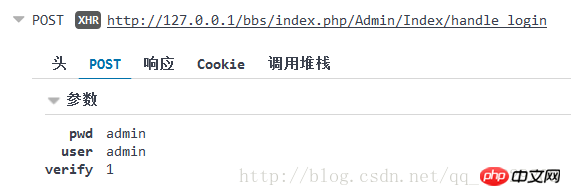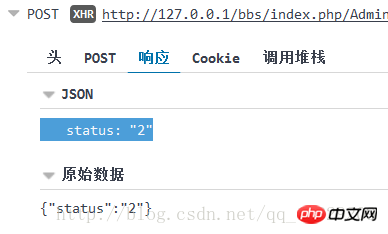 Web Front-end
Web Front-end
 JS Tutorial
JS Tutorial
 How do AJAX users jump to the page after logging in? Explanation of ajax user jump page (with examples)
How do AJAX users jump to the page after logging in? Explanation of ajax user jump page (with examples)
How do AJAX users jump to the page after logging in? Explanation of ajax user jump page (with examples)
This article mainly introduces the situation of jump after ajax user logs in. There are detailed code examples below. Friends in need should quickly take a look. Let’s start the introduction of this article now
I have been learning the use of TP framework recently. When I was working on the backend management system, I made a backend login page. I wanted to prompt the user in real time about the return status of the input information.

Of course, judging that the username and password are incorrect must go through background verification and be displayed on the page without refreshing, so the first thing to think about is asynchronous processing (this is the door Art)
The $this_ajaxReturn(); method on TP can return the information to the previous section, and use jq to judge the local refresh of the corresponding information.
But when I actually enter the correct username and password, I cannot jump to the background management page and just return a json data stream


It turns out that when asynchronous is used to receive the data returned from the background, it is handed over to the js code for processing and the json stream is returned. Then the background redirection enters the stream instead of The page will be refreshed, and the page information can only be seen through the received response. (If you want to see more, go to the PHP Chinese website AJAX Development Manual column to learn)
Then we know that it is processed in js, then we can use js to redirect Windows.location .href='url';Jump to the specified page
js code
$(function(){
$('button').click(function(){
var user = $('input[name=user]'); var pwd = $('input[name=pwd]'); var verify = $('input[name=verify]'); if(user.val() == ''|| pwd.val() == '')
{
$('[name=user]').focus();
$('#errormsg').html("<strong>用户名或密码不能为空<strong>"); return false;
} else if(verify.val() == '')
{
$('#errormsg').html("<strong>验证码不能为空<strong>"); return false;
} else{
$.ajax({
url: handle,
data:{'user':user.val(),'pwd':pwd.val(),'verify':verify.val()},
type: "POST",
dataType:'json',
success:function(data){
if(data.status == '1'){
window.location.href = dr;
} else if (data.status == '2') {
$('#errormsg').html("<strong>验证码错误<strong>");
}else if (data.status == '0') {
$('#errormsg').html("<strong>用户名或密码错误!<strong>");
}
},
error : function(data) {
alert("出错:" + data.code);
}
});
}
});
})Backend code
$verify = I('verify','','md5'); if($verify !== $_SESSION['verify'])
{ $this->ajaxReturn(array('status' =>'2')); die();
} $username=I('user','',''); $passward=I('pwd','',''); $date=M('admin',NULL); $date->where(array('username' => $username))->find(); if($date and $date->passward == $passward)
{ $id = $date->id; $login_time = time() ; $login_ip = get_client_ip(); $date = array('id' => $id,'login_ip' => $login_ip,'login_time' => $login_time );
M('admin')->save($date);
session('uid',$date['id']);
session('ip',$date['login_ip']); // $this->ajaxReturn(array('status' =>'1'));
// $this->success('登陆成功',U('Admin/Admin/index'));
} else
{ $this->ajaxReturn(array('status' =>'0')); $this->redirect('Admin/Index/index');
}
}The above also has the process of accepting background data to determine whether the username and password are correct
This article ends here (if you want to see more, go to the PHP Chinese website Learn in the column of the AJAX User Manual). If you have any questions, you can leave a message below.
The above is the detailed content of How do AJAX users jump to the page after logging in? Explanation of ajax user jump page (with examples). For more information, please follow other related articles on the PHP Chinese website!

Hot AI Tools

Undresser.AI Undress
AI-powered app for creating realistic nude photos

AI Clothes Remover
Online AI tool for removing clothes from photos.

Undress AI Tool
Undress images for free

Clothoff.io
AI clothes remover

AI Hentai Generator
Generate AI Hentai for free.

Hot Article

Hot Tools

Notepad++7.3.1
Easy-to-use and free code editor

SublimeText3 Chinese version
Chinese version, very easy to use

Zend Studio 13.0.1
Powerful PHP integrated development environment

Dreamweaver CS6
Visual web development tools

SublimeText3 Mac version
God-level code editing software (SublimeText3)

Hot Topics
 1377
1377
 52
52
 How to evaluate the cost-effectiveness of commercial support for Java frameworks
Jun 05, 2024 pm 05:25 PM
How to evaluate the cost-effectiveness of commercial support for Java frameworks
Jun 05, 2024 pm 05:25 PM
Evaluating the cost/performance of commercial support for a Java framework involves the following steps: Determine the required level of assurance and service level agreement (SLA) guarantees. The experience and expertise of the research support team. Consider additional services such as upgrades, troubleshooting, and performance optimization. Weigh business support costs against risk mitigation and increased efficiency.
 How does the learning curve of PHP frameworks compare to other language frameworks?
Jun 06, 2024 pm 12:41 PM
How does the learning curve of PHP frameworks compare to other language frameworks?
Jun 06, 2024 pm 12:41 PM
The learning curve of a PHP framework depends on language proficiency, framework complexity, documentation quality, and community support. The learning curve of PHP frameworks is higher when compared to Python frameworks and lower when compared to Ruby frameworks. Compared to Java frameworks, PHP frameworks have a moderate learning curve but a shorter time to get started.
 PHP vs. Ajax: Solutions for creating dynamically loaded content
Jun 06, 2024 pm 01:12 PM
PHP vs. Ajax: Solutions for creating dynamically loaded content
Jun 06, 2024 pm 01:12 PM
Ajax (Asynchronous JavaScript and XML) allows adding dynamic content without reloading the page. Using PHP and Ajax, you can dynamically load a product list: HTML creates a page with a container element, and the Ajax request adds the data to that element after loading it. JavaScript uses Ajax to send a request to the server through XMLHttpRequest to obtain product data in JSON format from the server. PHP uses MySQL to query product data from the database and encode it into JSON format. JavaScript parses the JSON data and displays it in the page container. Clicking the button triggers an Ajax request to load the product list.
 How do the lightweight options of PHP frameworks affect application performance?
Jun 06, 2024 am 10:53 AM
How do the lightweight options of PHP frameworks affect application performance?
Jun 06, 2024 am 10:53 AM
The lightweight PHP framework improves application performance through small size and low resource consumption. Its features include: small size, fast startup, low memory usage, improved response speed and throughput, and reduced resource consumption. Practical case: SlimFramework creates REST API, only 500KB, high responsiveness and high throughput
 Golang framework documentation best practices
Jun 04, 2024 pm 05:00 PM
Golang framework documentation best practices
Jun 04, 2024 pm 05:00 PM
Writing clear and comprehensive documentation is crucial for the Golang framework. Best practices include following an established documentation style, such as Google's Go Coding Style Guide. Use a clear organizational structure, including headings, subheadings, and lists, and provide navigation. Provides comprehensive and accurate information, including getting started guides, API references, and concepts. Use code examples to illustrate concepts and usage. Keep documentation updated, track changes and document new features. Provide support and community resources such as GitHub issues and forums. Create practical examples, such as API documentation.
 How to choose the best golang framework for different application scenarios
Jun 05, 2024 pm 04:05 PM
How to choose the best golang framework for different application scenarios
Jun 05, 2024 pm 04:05 PM
Choose the best Go framework based on application scenarios: consider application type, language features, performance requirements, and ecosystem. Common Go frameworks: Gin (Web application), Echo (Web service), Fiber (high throughput), gorm (ORM), fasthttp (speed). Practical case: building REST API (Fiber) and interacting with the database (gorm). Choose a framework: choose fasthttp for key performance, Gin/Echo for flexible web applications, and gorm for database interaction.
 Detailed practical explanation of golang framework development: Questions and Answers
Jun 06, 2024 am 10:57 AM
Detailed practical explanation of golang framework development: Questions and Answers
Jun 06, 2024 am 10:57 AM
In Go framework development, common challenges and their solutions are: Error handling: Use the errors package for management, and use middleware to centrally handle errors. Authentication and authorization: Integrate third-party libraries and create custom middleware to check credentials. Concurrency processing: Use goroutines, mutexes, and channels to control resource access. Unit testing: Use gotest packages, mocks, and stubs for isolation, and code coverage tools to ensure sufficiency. Deployment and monitoring: Use Docker containers to package deployments, set up data backups, and track performance and errors with logging and monitoring tools.
 What are the common misunderstandings in the learning process of Golang framework?
Jun 05, 2024 pm 09:59 PM
What are the common misunderstandings in the learning process of Golang framework?
Jun 05, 2024 pm 09:59 PM
There are five misunderstandings in Go framework learning: over-reliance on the framework and limited flexibility. If you don’t follow the framework conventions, the code will be difficult to maintain. Using outdated libraries can cause security and compatibility issues. Excessive use of packages obfuscates code structure. Ignoring error handling leads to unexpected behavior and crashes.



